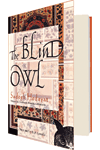In the 2006 documentary Forever, by Heddy Honigmann, which explores the reasons people visit the famed Père-Lachaise cemetery in Paris, an Iranian taxi driver standing before Sadegh Hedayat’s grave is visiting because Hedayat wrote of alienation. Later, he turns to the camera and sings the kind of song that, if you are an Iranian trying to keep loss and alienation at bay, will make you weepy.
Perhaps no other modern Iranian writer has been claimed by his countrymen more than Hedayat has. Born in Tehran in 1903 to an aristocratic family, Hedayat studied in Paris and went on to become one of the founders of modern fiction in Iran. And while he had a wide range—he wrote nationalist plays, satire, and both realist and surrealist fiction—he is most recognized for his novel The Blind Owl. Published in 1937 in a limited edition in India, where Hedayat was then living, the novel appeared in Iran in 1941 and went on to have a tumultuous existence in the hands of Iran’s ubiquitous censors. Translated into multiple languages, it has been reissued in the United States by Grove Press, with a 1957 translation by D. P. Costello and a poignant introduction by Porochista Khakpour.
A tale of one man’s isolation, the novel contains a maze of symbols, recurring images, social commentary, allusions to opium-induced states, contemplations of the human condition, interjections on art, and references to literary and religious texts—all of which have, for decades, made it fertile ground for critical interpretation. The most long-standing theory was espoused by the Iranian Communist Party (Tudeh), with which Hedayat for a time sympathized. The Tudeh’s claim was that the black mood in the book is an allusion to life under Reza Shah, who ruled Iran from 1925 until 1941. But as scholar Homa Katouzian points out in Sadeq Hedayat: The Life and Legend of an Iranian Writer, while Hedayat did oppose the shah’s tyrannical reign, the book is a far more universal statement about alienation. Often compared to the work of Franz Kafka (whom Hedayat admired), The Blind Owl also brings to mind Fernando Pessoa’s The Book of Disquiet in its stark meditation on dejection.
“There are sores which slowly erode the mind in solitude like a kind of canker,” begins the book, and in the pages that ensue we glimpse this solitude, through the narrator’s room, which “stands upon the ruins of thousands of ancient houses… like a tomb”; through the landscape of “crouching, accursed trees,” between which there are “ash-grey houses” where “no living creature could ever have dwelt”; and through the narrator’s estrangement from the “rabble-men” who bear “an expression of greed on their faces, in pursuit of money and sexual satisfaction.”
An ethereal girl appearing throughout offers hope. She is the image the narrator paints on his pen cases, a vision he falls in love with, and the portrait on an ancient jar, inside “an almond-shaped panel” (perhaps a reference to a mandorla, an almond-shaped contour found around images of Mary—the almond representing virgin birth). But the girl has a “double nature,” resurfacing as the narrator’s cunning mother, and, later, as his promiscuous wife.
Any discussion of Hedayat would be incomplete without mention of his suicide, by gassing, in 1951 in Paris—an event that has overshadowed his work. Perhaps this new edition will prompt a return to his work, a reexamination of the writing of the man who has been called Iran’s foremost modern writer.
—Dalia Sofer





